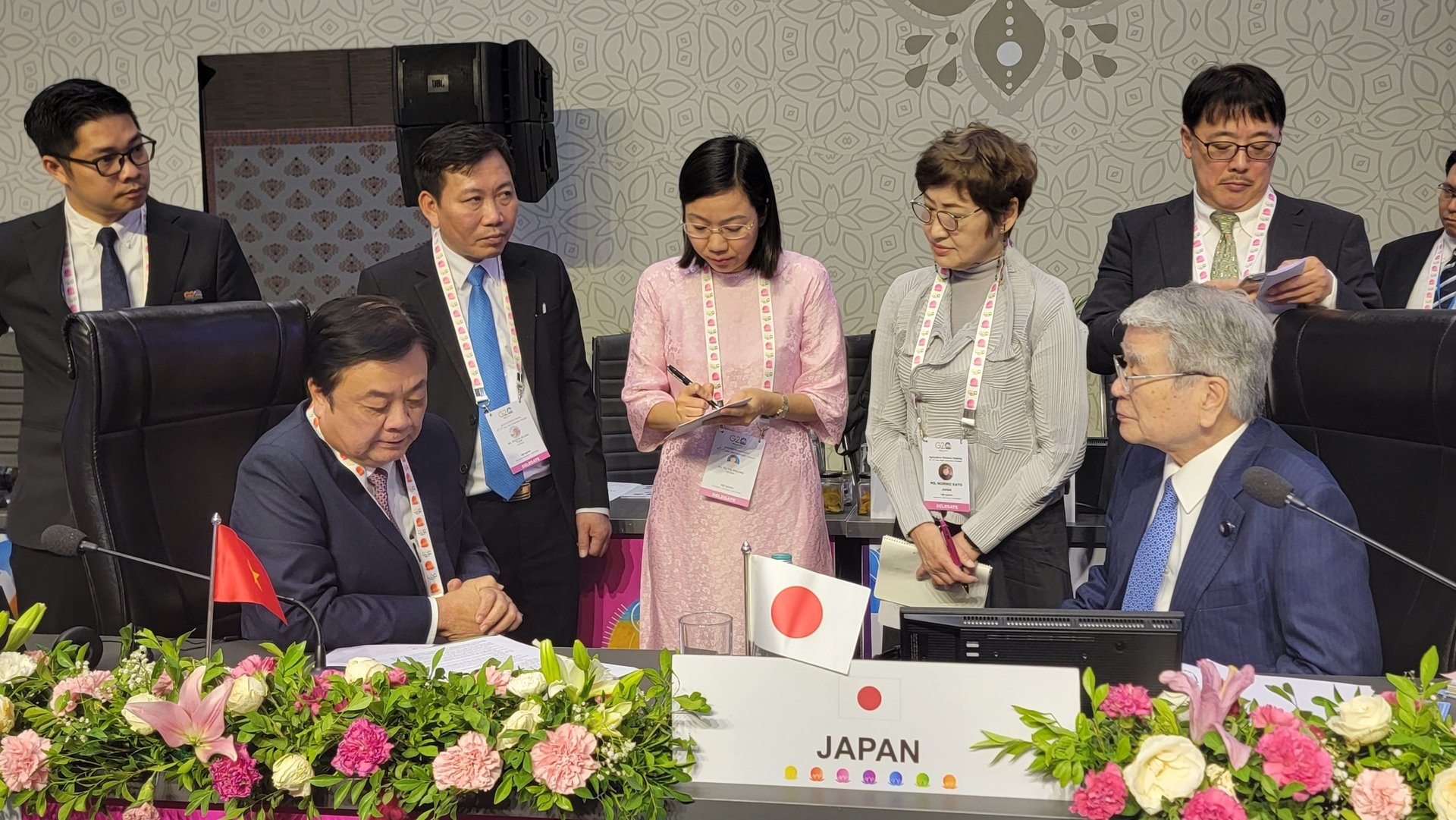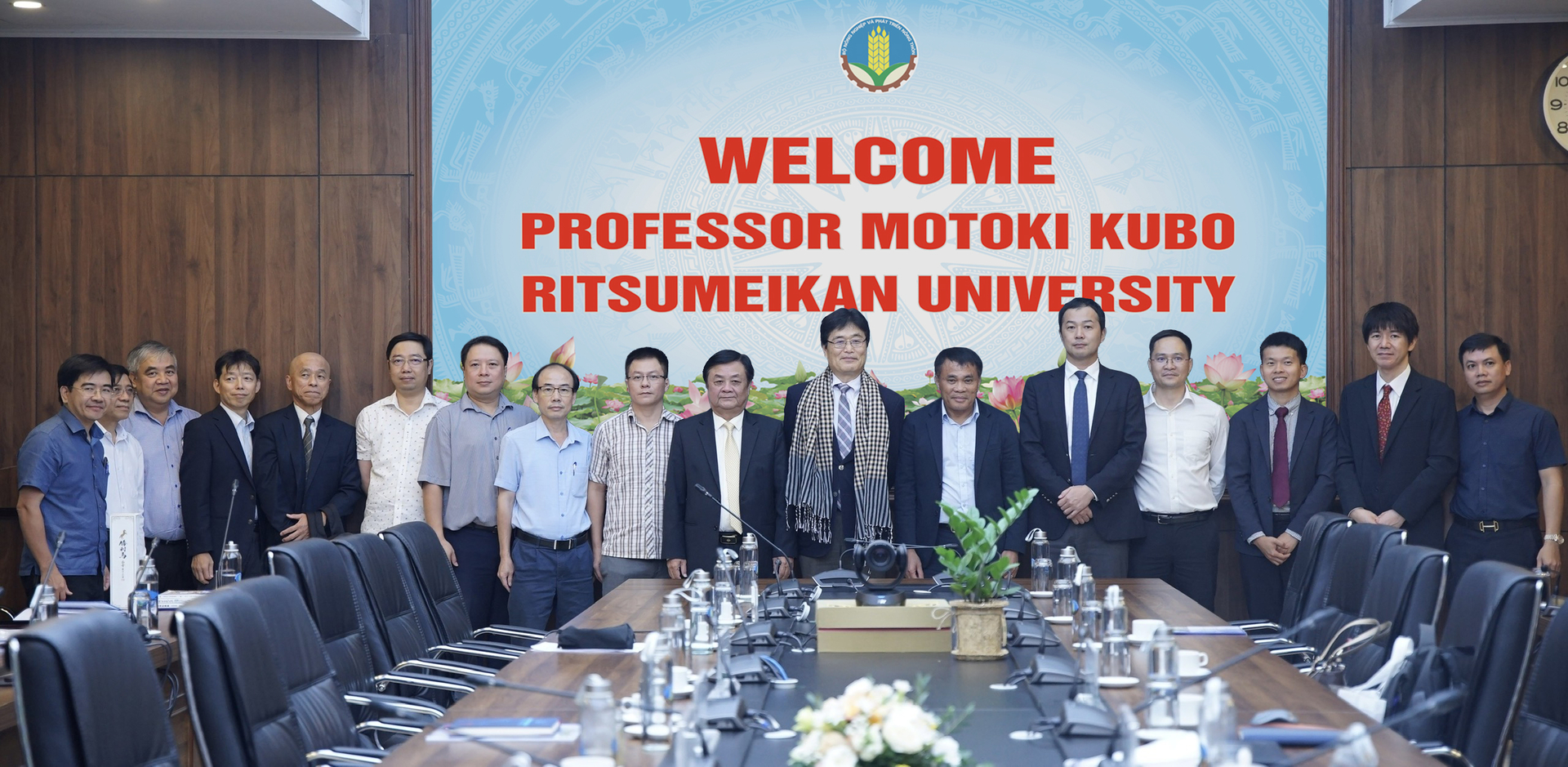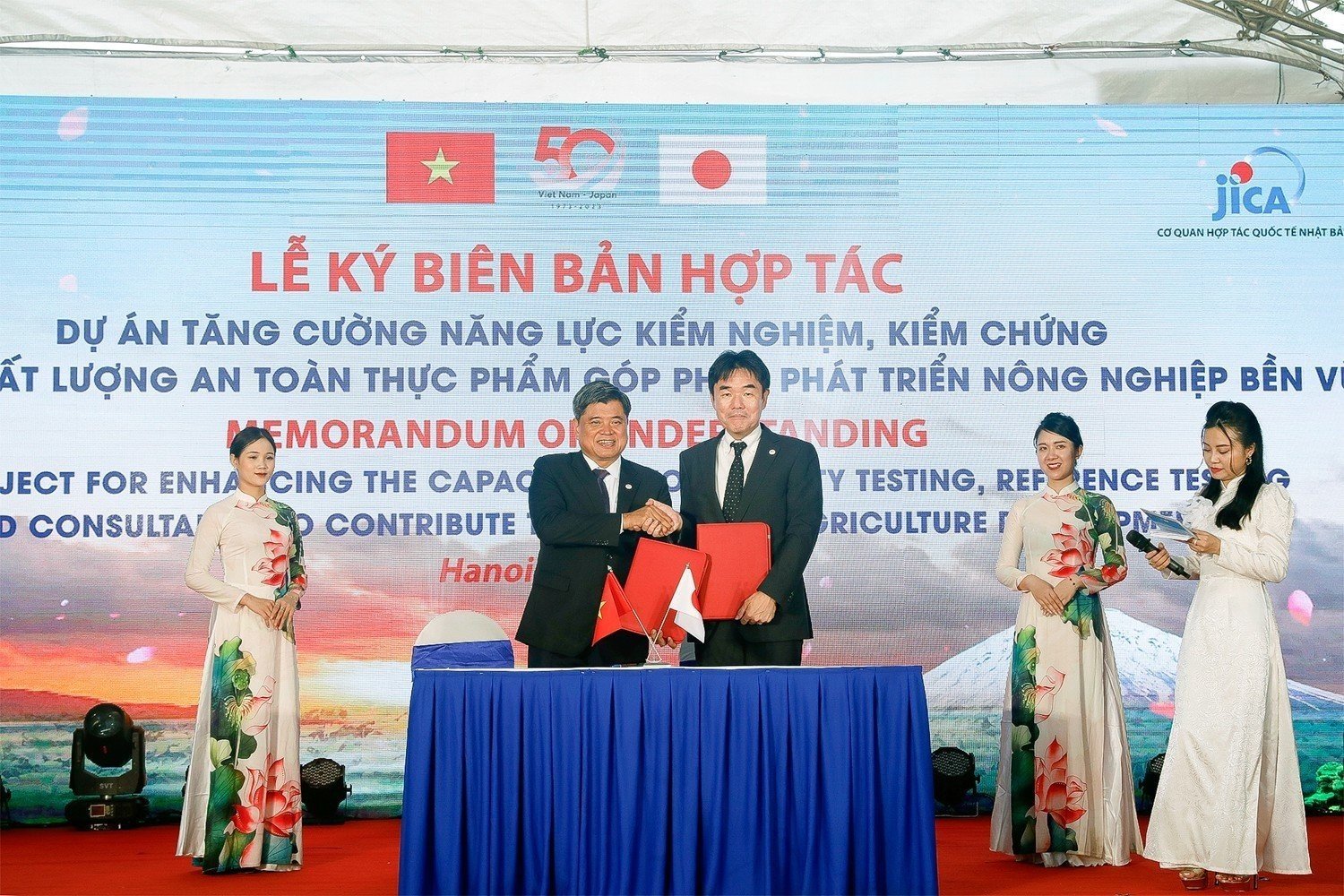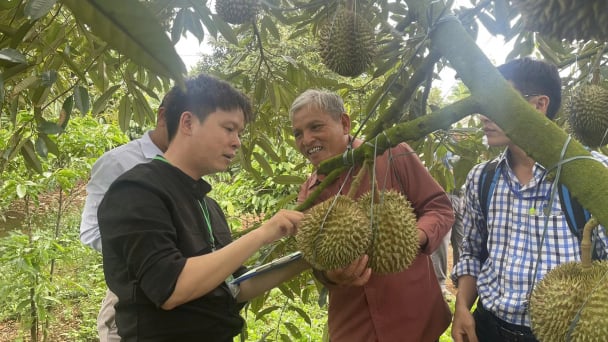May 31, 2025 | 12:56 GMT +7
May 31, 2025 | 12:56 GMT +7
Hotline: 0913.378.918
May 31, 2025 | 12:56 GMT +7
Hotline: 0913.378.918

Minister Le Minh Hoan discussed on the sidelines with Japanese Minister of Agriculture, Forestry and Fisheries Tetsuro Nomura on the occasion of attending the G20 Agriculture Ministers' Meeting in Hyderabad (India) in June 2023.
The agricultural cooperation between Vietnam and Japan has significantly contributed to the restructuring of agriculture and rural development in Vietnam. Japan has accompanied Vietnam's agriculture in a variety of sectors, including the establishment of a sustainable agriculture value chain, animal and plant quarantine, natural disaster prevention and combat, and irrigation development, among others.
On the occasion of the 50th anniversary of the establishment of diplomatic relations between Vietnam and Japan, Vietnam Agriculture News conducted an interview with Dr. Nguyen Do Anh Tuan, Director of the International Cooperation Department, Ministry of Agriculture and Rural Development, regarding the outstanding achievements in agricultural cooperation between the two countries, as well as the advantages, challenges, and future expectations of cooperation in this field.
Since the establishment of diplomatic relations between Vietnam and Japan in 1973, the two nations' relationship and partnership have been strengthened in all spheres. Can you reveal a few highlights of agricultural cooperation between the two nations over the past several years?
Along with the development of relations between the two countries, Vietnam - Japan cooperation in the sphere of agriculture has also been promoted over the past five decades. On the basis of numerous similarities (beginning with a wet rice civilization, the majority of the population working in agriculture, fragmented land, etc.), as well as the realization of numerous unique potentials and advantages, the two parties have and continue to promote agricultural development cooperation.
On the occasion of General Secretary Nguyen Phu Trong's 2015 visit to Japan, the Vietnamese and Japanese Ministries of Agriculture developed a Medium-Long-Term Vision for agricultural cooperation between the two countries. On this basis, strategic cooperation in the agricultural sector between the two nations is growing increasingly robust and substantive and has recently accomplished many extraordinary feats, including:

Minister Le Minh Hoan received and worked with Prof. Motoki Kubo and a group of experts on biological solutions for crops and soil improvement, from Ritsumekan University, Japan in July 2023.
Utilizing free trade agreements in which both nations participate, the two nations actively expand their markets for one another's agricultural products. Agriculture, forestry, and fisheries (AFF) bilateral trade turnover is always stable and balanced. Japan is presently one of Vietnam's most significant AFF export markets, accounting for approximately 7.5% of the total AFF export turnover each year. Over the past decade, export growth has averaged 6.35 percent per year.
Regarding development cooperation (ODA), Japan continues to be Vietnam's largest provider of ODA for the agricultural sector. Aid for natural disaster response and fisheries control.
Japan annually dispatches experts and advisors to assist the agricultural industry in these regions. In the past decade, the Japanese government has supported Vietnam's agricultural sector with 15 ODA projects totaling approximately 800 million USD to continue improving agriculture-related infrastructure; Deploying overall solutions to build the food value chain; promoting investment by private enterprises (application of modern technology); and providing support for improving policies, institutions, strategies, and agricultural human resource development.
In terms of foreign direct investment (FDI), Japanese investors are becoming increasingly interested in Vietnamese agriculture due to the respective advantages of both nations. Japanese companies pay close attention to vegetable and flower products, tea, high-tech livestock, and agricultural product processing technology.
Can you discuss the benefits and difficulties of agricultural cooperation between the two nations?
The participation of both sides in multilateral cooperation agreements such as the ASEAN-Japan Comprehensive Economic Partnership Agreement (AJCEP), The Vietnam - Japan Economic Partnership Agreement (VJEPA), etc. creates the conditions for the cooperative relationship between Vietnam and Japan to deepen and advance to a higher level.
The commodity structures of Vietnam and Japan are mainly complementary and non-competitive, as demonstrated by their trade relations. Currently, Vietnam has a competitive advantage in agricultural products, seafood, and processed consumables with significant import demand from Japan.
In addition, Japan has a large economy, but Vietnam's export products to this market have a limited structure, so there is still ample space for development in the near future. Japan is a market with substantial purchasing power, particularly for agricultural and aquatic products, processed meals like shrimp, seafood, poultry, fresh and processed vegetables, cereals, and coffee. Due to the Covid-19 epidemic's disruption of Chinese supply sources, Japan is seeking alternative and more diverse sources of supply from other nations. Southeast Asian countries (ASEAN), including Vietnam, are the target region.

Deputy Minister Tran Thanh Nam (left) and Mr. Sugano Yuichi, Chief Representative of JICA Vietnam, signed a Memorandum of Approval "Project to strengthen the capacity of testing, verifying and consulting on food safety quality contributing to sustainable agricultural development” July 20, 2023.
However, agricultural cooperation between the two nations faces obstacles such as Japan's extremely stringent agricultural technical standards, fluctuations in the global economy, and protectionism of domestic production. In order to surmount these difficulties and challenges, the two nations must make additional efforts in negotiations, the development of appropriate cooperation and exchange mechanisms, and the modification of production processes and technology.
Japan has strengths in digital transformation, green agriculture, strategic infrastructure, clean agriculture, and high technology. With the aim of achieving peace, green, and sustainable development in mind, Japan excels in digital transformation, green agriculture, strategic infrastructure, clean agriculture, and high technology. Can you describe the current state of cooperation between the two nations in these fields?
Vietnam has issued the Sustainable Agriculture and Rural Development Strategy for 2021 to 2030, with a vision to 2050, with the objective of "building commodity-producing agriculture while developing profit-based agriculture, toward modernity with productivity, quality, efficiency, sustainability, and high competitiveness..." In addition, we are implementing the Action Plan for Transforming the Food System in the direction of openness, accountability, and sustainability.
Japan has a wealth of experience in developing ecological, secure, and sustainable agriculture in an organic manner. In order to effectively implement the Sustainable Agriculture and Rural Development Strategy, Japan's cooperation and support for Vietnam are of the utmost importance.
Vietnam and Japan inked a Cooperation on Low Carbon Growth for the years 2021 through 2030 in 2021. Vietnam participates actively in global initiatives with Japan, including Agricultural Innovation for Climate and Sustainable Agricultural Transformation in Monsoon Countries. Participate in the Japan-ASEAN regional food security cooperation mechanism. In addition, both countries are signatories to the Comprehensive and Progressive Agreement for Trans-Pacific Partnership (CPTPP), which has entered into force, and both have green growth-related cooperation provisions.

Deputy Minister Tran Thanh Nam and delegates cut the ribbon to open the testing laboratory funded by the Japanese Government for the Center for Testing, Verifying and Consulting Quality of Agriculture, Forestry and Fisheries - now the Reference Testing and Agrifood Quality Consultancy (RETAQ).
Could you expand on the future directions of agricultural cooperation between Vietnam and Japan?
Since 2015, the two parties have maintained the high-level dialogue mechanism "Medium-Long-Term Vision on Vietnam-Japan Agricultural Cooperation," which has spanned two periods (2015-2019; 2020-2024). Currently, the two parties are revising and reassessing their past cooperation in order to develop a Vision for the new period 2025-2029.
In the coming period, directions to promote cooperation on food security and adaptation to climate change can be considered in light of new crises; low-carbon, low-emission agricultural value chain; circular agricultural economy, green growth; sustainable infrastructure development in Vietnam, particularly logistics in the agricultural value chain; Participation in regional cooperation on green growth.
Thank you!
Translated by Dieu Linh

(VAN) For the durian industry to succeed, the value chain must fulfill its commitments to the government, the community, and international partners.

(VAN) Vaccinating juvenile pangasius helps reduce disease, antibiotic use, and farming costs, increasing profits for export-oriented farmers in An Giang.

(VAN) Due to a limited supply of workforce and competitive recruitment requirements, businesses struggle to retain talented veterinary human resources.

(VAN) WOAH’s guidance aims to mitigate disease risks through a One Health approach that balances economic, conservation, and public health interests.

(VAN) Ms. Nguyen Thi Dung, Deputy Director of Ngoc Hoang Cooperative, shared about the journey of bringing dragon fruit to Europe, achieving annual revenues in the billions of VND.

(VAN) Bamboo products from Thang Tho Bamboo Cooperative have reached many countries around the world, while also creating jobs for local workers.

(VAN) The Management Board of Con Dao National Park reported that a green sea turtle, tagged in the Philippines, has traveled thousands of kilometers to lay 84 eggs on Bay Canh Islet.